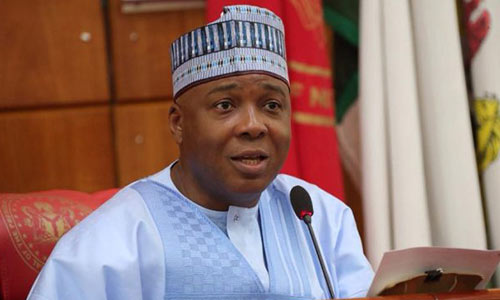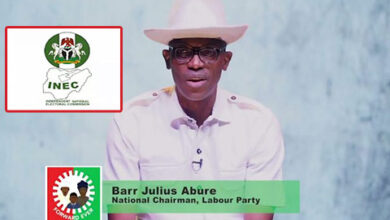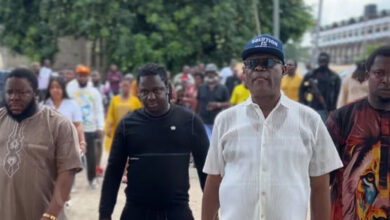Buhari Harassed Me For Opposing Reckless Borrowing — Saraki Alleges Subservience Among Successor Senate Presidents

A former Senate President, Bukola Saraki, weekend said the reason former president Muhammadu Buhari harassed and intimidated him was because he opposed his habitual uncurbed borrowings.
Saraki, however, maintained that while he was being harassed by the Buhari administration, the Nigerian elite as well as ordinary people stood aloof, a situation that has affected his successors’ performance in office.
Appraising the current political dynamics in Nigeria, he concluded that subsequent presidents of the senate have had to become subservient to the executive, learning from his ordeal.
Arguing that no senate president would like to be subjected to the kind of intimidation he and his team were subjected to by Buhari, Saraki agreed that persons who occupied the position after him had become a rubber stamp to the executive arm of government.
The former Kwara State governor spoke at the 2025 Reunion Gala Celebration of King’s College Old Boys Association (KCOBA) of North America, Houston, Texas, United States. His presentation was themed: “Empowering the Future from Legacy to Infinity.”
Other prominent Nigerians who attended the event during which Saraki was presented with the Rex E. O. Akpofure Award for Outstanding Achievement, were the Emir of Kano, Muhammadu Sanusi II; a renowned Nigerian-American Pediatric Surgeon, Dr. Oluyinka Olutoye; President of Toronto Raptors, Mr. Masai Ujuri and a Nigerian-American Physician, Dr Sam Dagogo-Jack.
Saraki laid Nigeria’s political challenges on the feet of leaders who were never prepared for the arduous task of governance, at the same time taking a swipe at professionals who insisted that politics was dirty and therefore not for persons with integrity.
Saraki’s tenure as senate president from 2015 to 2019 was marked by a frosty relationship with Buhari, including political rivalry, legal confrontations, and institutional clashes.
The discord began with Saraki’s controversial ascent to the senate presidency in June 2015. Defying the All Progressives Congress (APC) leadership’s preference for Ahmad Lawan. Saraki secured the position with support from opposition Peoples Democratic Party (PDP) senators.
Tensions escalated as Saraki faced multiple legal challenges, including charges of false asset declarations related to his tenure as Kwara State governor.
Although many charges were dismissed, the timing and persistence of these cases led people to believe that Saraki was being politically persecuted by the executive branch.
The relationship further deteriorated when Saraki defected from the APC to the PDP in 2018, citing marginalisation and a lack of internal democracy within the ruling party.
The defection intensified efforts by APC loyalists to remove him from the Senate presidency, culminating in a failed impeachment attempt in August 2018.
Despite occasional attempts at reconciliation, the period was marked by legislative-executive standoffs, including delays in confirming presidential nominees and passing key legislations as well as the failure of Buhari to assent to many legislations by the Saraki-led senate.
Since Saraki left the position, the label has been particularly associated with his successor, Lawan as well as the current Senate President, Godswill Akpabio, who have been accused of failing to assert their independence, with bills and policies from the executive passed with minimal debate or opposition.
Saraki said: “The legislature under my leadership was silenced, harassed, assaulted, bullied, and blackmailed, and the executive deliberately frustrated the passage of good laws, initiatives, and recommendations that would have been highly beneficial to our society.
“We were like orphans. The elite and ordinary people kept quiet, were nonchalant, and stayed aloof. Now, years after we left office, subsequent leadership of the National Assembly would rather be a rubber stamp and play dumb because they do not want to go through the harrowing experience that Saraki went through.
“I could have agreed with everything the Presidency under Buhari wanted and cut deals with them all the way. I would have been a good ally. Thus, when I read posts on social media or stories in the traditional media criticising the current National Assembly and praising our tenure, I just shrug my shoulders and feel unconcerned.
“This is a big failure of followership, and it is an enabler for the continuous failure of leadership. These sad developments are indications that our institutions are weak. Instead of building institutions, we are building strong men and women.”
The former senate president pointed out that his experience in governance had shown that many people elected into key offices got there without any idea or plan of what policies, programmes, and projects they want to execute and what changes they want to effect.





